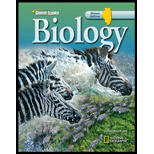
Concept explainers
To define:
The given vocabulary term
Introduction:
The lineage that led to humans split off from the other African apes occurred sometime between 8 and 5 mya. Hominins include humans and all their extinct relatives. The evolutionary changes in hominoids led to bipedalism in hominins. The earliest fossils of species that show some degree of bipedalism are 6- 7 million years old.
Answer to Problem 12A
Australopithecines are the hominins that lived in in east- central and southern part of Africa between 4.2 and 1 mya and had apelike brains and jaws.
Explanation of Solution
An anthropologist Donald Johanson discovered an australopithecine skeleton named Lucy in Kenya in1974. The first hominins that were truly bipedal were the australopithecines.
The discovery of fossil of Lucy is very significant as it was the first complete australopithecine fossil to be discovered. She was a member of species A.afarensis which lived between 4 and 2.9 mya. Lucy was about the size of a chimpanzee and had a typical australopithecine skull and small brain. The structure of her skeleton suggested that A.afarensis had small brains and were bipedal.
Chapter 16 Solutions
Biology Illinois Edition (Glencoe Science)
Additional Science Textbook Solutions
Campbell Biology: Concepts & Connections (9th Edition)
Applications and Investigations in Earth Science (9th Edition)
Human Anatomy & Physiology (2nd Edition)
Biology: Life on Earth (11th Edition)
Microbiology: An Introduction
Campbell Biology (11th Edition)
- There is a species of eagle, which lives in a tropical forest in Brazil. The alula pattern of its wings is determined by a single autosomal gene with four alleles that exhibit an unknown hierarchy of dominance. Genetic testing shows that individuals 1-1, 11-4, 11-7, III-1, and III-4 are each homozygous. How many possible genotypes among checkered eagles in the population?arrow_forwardwhat is this called?arrow_forwardcan you help me identify this it's based on onion rootarrow_forward
- Which evidence-based stress management techniques are most effective in reducing chronic stress and supporting college students’ academic success?arrow_forwardstudents in a science class investiged the conditions under which corn seeds would germinate most successfully. BAsed on the results which of these factors appears most important for successful corn seed germination.arrow_forwardI want to write the given physician orders in the kardex formarrow_forward
- Amino Acid Coclow TABle 3' Gly Phe Leu (G) (F) (L) 3- Val (V) Arg (R) Ser (S) Ala (A) Lys (K) CAG G Glu Asp (E) (D) Ser (S) CCCAGUCAGUCAGUCAG 0204 C U A G C Asn (N) G 4 A AGU C GU (5) AC C UGA A G5 C CUGACUGACUGACUGAC Thr (T) Met (M) lle £€ (1) U 4 G Tyr Σε (Y) U Cys (C) C A G Trp (W) 3' U C A Leu בוט His Pro (P) ££ (H) Gin (Q) Arg 흐름 (R) (L) Start Stop 8. Transcription and Translation Practice: (Video 10-1 and 10-2) A. Below is the sense strand of a DNA gene. Using the sense strand, create the antisense DNA strand and label the 5' and 3' ends. B. Use the antisense strand that you create in part A as a template to create the mRNA transcript of the gene and label the 5' and 3' ends. C. Translate the mRNA you produced in part B into the polypeptide sequence making sure to follow all the rules of translation. 5'-AGCATGACTAATAGTTGTTGAGCTGTC-3' (sense strand) 4arrow_forwardWhat is the structure and function of Eukaryotic cells, including their organelles? How are Eukaryotic cells different than Prokaryotic cells, in terms of evolution which form of the cell might have came first? How do Eukaryotic cells become malignant (cancerous)?arrow_forwardWhat are the roles of DNA and proteins inside of the cell? What are the building blocks or molecular components of the DNA and proteins? How are proteins produced within the cell? What connection is there between DNA, proteins, and the cell cycle? What is the relationship between DNA, proteins, and Cancer?arrow_forward
 Human Anatomy & Physiology (11th Edition)BiologyISBN:9780134580999Author:Elaine N. Marieb, Katja N. HoehnPublisher:PEARSON
Human Anatomy & Physiology (11th Edition)BiologyISBN:9780134580999Author:Elaine N. Marieb, Katja N. HoehnPublisher:PEARSON Biology 2eBiologyISBN:9781947172517Author:Matthew Douglas, Jung Choi, Mary Ann ClarkPublisher:OpenStax
Biology 2eBiologyISBN:9781947172517Author:Matthew Douglas, Jung Choi, Mary Ann ClarkPublisher:OpenStax Anatomy & PhysiologyBiologyISBN:9781259398629Author:McKinley, Michael P., O'loughlin, Valerie Dean, Bidle, Theresa StouterPublisher:Mcgraw Hill Education,
Anatomy & PhysiologyBiologyISBN:9781259398629Author:McKinley, Michael P., O'loughlin, Valerie Dean, Bidle, Theresa StouterPublisher:Mcgraw Hill Education, Molecular Biology of the Cell (Sixth Edition)BiologyISBN:9780815344322Author:Bruce Alberts, Alexander D. Johnson, Julian Lewis, David Morgan, Martin Raff, Keith Roberts, Peter WalterPublisher:W. W. Norton & Company
Molecular Biology of the Cell (Sixth Edition)BiologyISBN:9780815344322Author:Bruce Alberts, Alexander D. Johnson, Julian Lewis, David Morgan, Martin Raff, Keith Roberts, Peter WalterPublisher:W. W. Norton & Company Laboratory Manual For Human Anatomy & PhysiologyBiologyISBN:9781260159363Author:Martin, Terry R., Prentice-craver, CynthiaPublisher:McGraw-Hill Publishing Co.
Laboratory Manual For Human Anatomy & PhysiologyBiologyISBN:9781260159363Author:Martin, Terry R., Prentice-craver, CynthiaPublisher:McGraw-Hill Publishing Co. Inquiry Into Life (16th Edition)BiologyISBN:9781260231700Author:Sylvia S. Mader, Michael WindelspechtPublisher:McGraw Hill Education
Inquiry Into Life (16th Edition)BiologyISBN:9781260231700Author:Sylvia S. Mader, Michael WindelspechtPublisher:McGraw Hill Education





